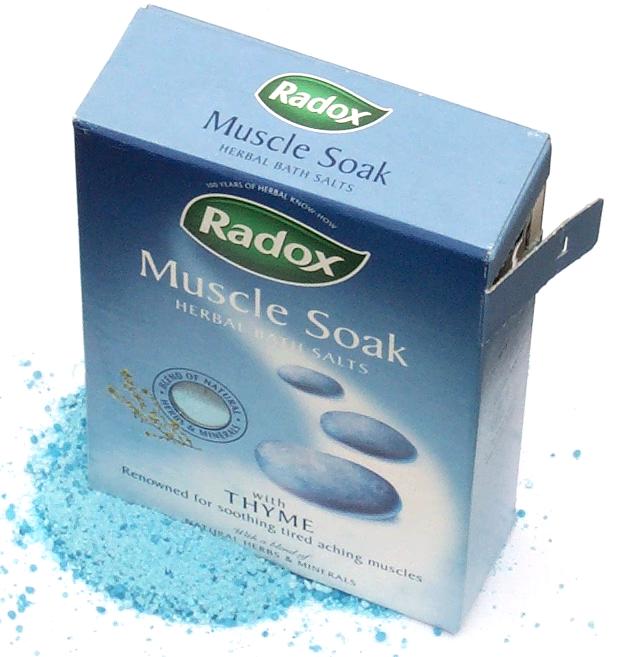Epsom salt or bath salts can make a warm bath more relaxing. But, there is more to it than that. Let’s answer the question: is Epsom salt a laxative?
Epsom salt is the common name for magnesium sulfate. This is a mineral made from the combination of magnesium, sulfur, and oxygen. It is different from your table salt which is scientifically called sodium chloride. And, it differs both in composition and the taste. Contrary to the salty flavor of table salt, Epsom salts are bitter and might ruin your dish when added to it.
Fun fact: Epsom salt is named after the town where it was originally discovered: Epsom in Surrey, England.
Another name for Epsom salt is “bath salt”. You guessed it right – it’s dissolved in baths for a luxurious soaking session. It is claimed to help relieve the sore muscles of the body and reduce the pain of sprains or bruises.
You can buy Epsom salt in drugstores, grocery stores and online. Magnesium sulfate (MgSO4) is also available as an injectable solution and infusion solution. These solutions are used to treat hypomagnesemia, toxemia of pregnancy, torsades de pointes, and stopping of preterm labor among others. Some people dissolve this mix in water to treat constipation.
Constipation
Some signs and symptoms of constipation include having an irregular bowel movement of fewer than three bowels per week. These bowels are lumpy, dry and painful or hard to pass. Treating constipation involves lifestyle and dietary changes. Increasing fluid consumption and eating more fruits and vegetables or fiber-rich food is a good starting point. Taking laxatives is also an option, but it’s recommended as a short term solution only.
Is Epsom Salt a Laxative?
Laxatives help treat constipation. When thinking of laxatives, it is normal to imagine them in a tablet or capsule form, right?
There are different types of laxatives such as fiber laxatives, stool softeners, stimulant laxatives, and osmotic laxatives. Different food can also act as laxatives and can help with constipation.
Epsom salt is an osmotic laxative that creates an osmotic gradient for water retention in the body. This type of laxative helps with both occasional and chronic constipation. It retains fluids and can increase distention and movement in the colon.
Not for Everyone
Take it with a grain of salt (pun intended), but using dissolved Epsom salt is not for everyone. It is harmless when used for bathing, but it gets serious when consumed.
True that magnesium sulfate has a laxative effect, but it has some side-effects such as:
- abdominal bloating
- flatulence
- nausea
- diarrhea
Magnesium also has significant roles in the body, particularly in nerve and muscle functions, muscle contraction, bone strength, blood glucose, etc.
Did you know that magnesium is responsible for more than 300 biochemical reactions inside the body?
This means that an imbalance of magnesium can have drastic effects on a person. These effects range from muscle weakness to respiratory collapse. It depends on their health status and magnesium levels in their body.
If you have pre-existing conditions such as heart, neuromuscular, or kidney disease, diabetes, eating disorder, or are pregnant, you have to ask your doctor whether taking Epsom salts is the right laxative for you.
Think Twice Before you Drink
Thinking twice about drinking Epsom salts is particularly important for pregnant women. Why? Because it can affect the skeletal system of the fetus.
Magnesium sulfate can interact with many different drugs too. Some effects can range from mild to moderate and to serious interactions. Make sure that you inform your physician or pharmacist before using Epsom salt as a laxative.
You might say, “but Epsom salt is a medicine, so why can’t I do it on my own?”
The important factor here is that the infusion and the injectable solution has a carefully measured dosage and strength. The patient’s conditions are also considered before administering this type of medication.
But, if you have decided to push through with your salt drink, you have to check if you are taking food-grade Epsom salt. Read and follow the label of the package because the concentration differs per brand.
The effect of drinking Epsom salt ranges from 30 minutes to six hours. Make sure you drink plenty of fluids after taking your laxative drink.
The Natural Removal Team
Excessive magnesium intake rarely happens. If it does happen, it only means that the person took in supplements or had too many magnesium laxatives. Why? Because the body has a natural way of removing excess magnesium.
The same goes for hypomagnesemia or lack of magnesium in the body. This condition is common for alcoholics, those who have malabsorption of minerals and nutrients, or those with type 2 diabetes.
If you are curious about what natural food has magnesium, you’re in luck because they are fairly common. Here are some magnesium-rich foods that you can incorporate in your diet:
- Banana
- Avocado
- Almond
- Cashew
- Tofu
- Soy products
- Brown rice and other whole grains
- Milk
So, is Epsom salt a laxative? Yes. But there are other safer and more natural alternatives for curing constipation. Consider lifestyle change! Drink more fluids, exercise, and eat a balanced diet. This is a more sustainable alternative to running and finding laxatives on short notices. If you have chronic constipation, always ask your physician first before trying to self medicate on Epsom salts.
[thrive_toggles_group”][thrive_toggles title=”References” no=”1/1″]https://medlineplus.gov/ency/article/002423.htm https://epsomsalts.co.uk/index.php?main_page=page&id=19 https://www.rxlist.com/consumer_magnesium_sulfate_mgso4/drugs-condition.htm https://reference.medscape.com/drug/mgso4-magnesium-sulfate-344444 https://www.ncbi.nlm.nih.gov/pmc/articles/PMC3036964/#!po=61.8421 https://www.medicalnewstoday.com/articles/322160.php#use https://www.everydayhealth.com/drugs/magnesium-sulfate https://www.healthline.com/nutrition/epsom-salt-benefits-uses#uses[/thrive_toggles][/thrive_toggles_group]



